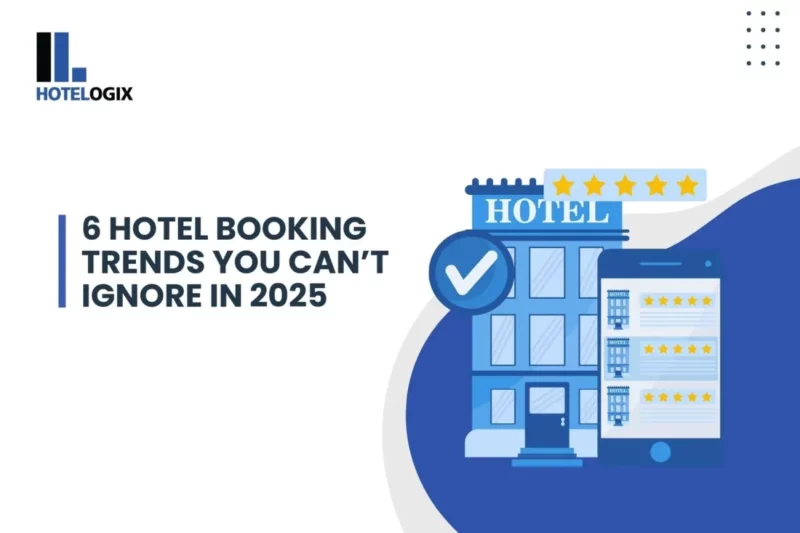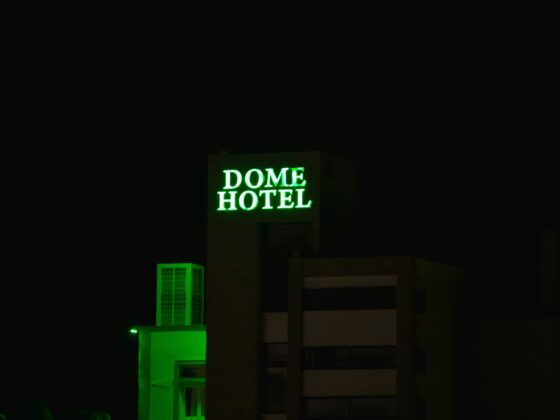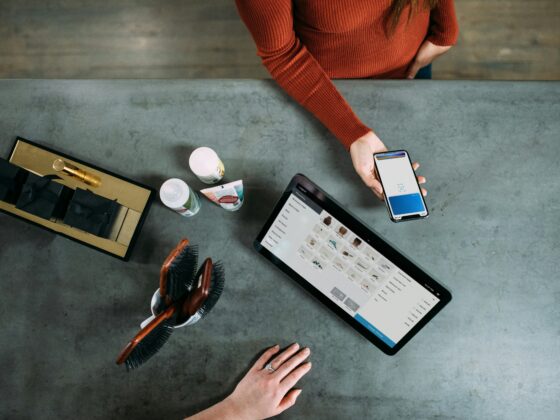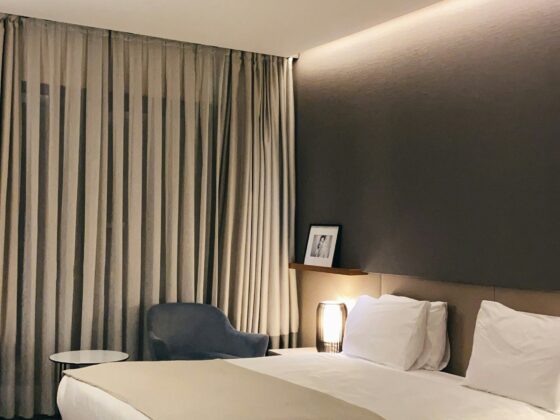Leora: I really believe that everyone should be a marketer, whether you have marketing in your title or not. Everyone should have a marketing mindset. If you’re an entrepreneur, an intrapreneur, you should have a marketing mindset. Marketing involves critical thinking and strategic thinking. Not everybody thinks critically and analyzes situations. Not everybody thinks strategically and looks at long-term and the future. Many of us do in the business because we’re all business people, but that’s not necessarily the case for others. So having a critical mindset, critical thinking, strategic thinking helps us connect better with others. And that’s marketing. I actually think what comes out of this book also is that I equate marketing to hospitality. When you’re connecting with people, it is hospitality. And so I think marketing is really important. I feel that some people take the word marketing and turn it into a dirty word. I’ve heard people who say, oh, that advertisement, why is that person, they’ve got so much money, why are they the spokesman for that? Well, maybe it’s because they really do believe in that product and they know that they have that influence. I think for a lot of folks, I don’t believe in influencers. That’s not how I want to do my marketing. The truth is, if we build it, they don’t always come, even if we do the great work that attracts people to want to come. We do need to have word of mouth. That is marketing. Where I’m also taking this book is that marketing is not just selling the product. Marketing is about educating and informing. And so when it comes to connecting to people through wellness, through sustainability, through community, through topics that really matter to folks, we need to educate and inform and communicate in a way that is trustworthy and not sell, sell, sell. And so I’m hoping that that’s what folks take away from this book, is that it’s a nuanced approach to marketing that’s really about connecting.
Josiah: I’m hearing a nuanced approach. I’m also hearing the implications being much broader than might appear at first glance. And so I’m hearing if you’ve created something that is special, you kind of owe it to yourself, you owe it to the people that you’re working with to market it well so that others can experience that. And I’m hearing this comes down to communication. It’s the way that you’re interacting. That feels very evergreen, regardless of the market cycle. I’m thinking a lot about where the hotel industry is in the middle of 2024. And also, there’s an opportunity there as well, whatever lies ahead to differentiate your business and to stand out and maybe steal share from other organizations. That might be the only path to growth here. So that’s a more tactical, maybe financial focus for this. But I hear, I think that’s a fresh perspective where great marketing can be an extension of the way that you show hospitality. So it feels like across the board, this is key. You have an interesting perspective, Leora, because you have worked both at hotels in the tourism industry. Now you teach people about how to think about all of this. I’m curious, why write a book? You’re a professor. Why go through all of the effort to write a book and what was the origin of this?
Leora: Sure. And it was a lot of effort, for whatever it’s worth. It took two years, actually. I was blessed. The opportunity of my teaching is a happy accident. I was not trained as an instructor. Boston University holds a dear place in my heart, because I did get my graduate degree from there. And I did conduct my master’s thesis with the School of Hospitality at Boston University. But teaching was really what I call one of the happy accidents in my life. And I just completed 10 years there. I’ve been there 10 years. This was supposed to be a one-semester gig. I never thought it would ever be 10 years and I’d be talking about this. And my dean offered the opportunity to take a sabbatical, which I never would have expected. I never planned on. Didn’t even occur to me. I am not one of the PhD faculty conducting research. I’m of the practice. And so when the opportunity came my way, I’m the kind of person, if a door opens just a little bit, I got to kick it down and see where I can take it. And I was just grabbing that opportunity to take a sabbatical, which, by the way, I highly advocate for every business, for people who work for a long period of time. A sabbatical is necessary. Recently, I was speaking with Stephanie Glanzer, who’s at MGM. She and I took our sabbaticals around the same time. And I think it’s great that companies are offering sabbatical periods also. It’s just so healthy to detach and get fresh thinking and rejuvenate. But I digressed. When I was on sabbatical, I actually took the opportunity to reach out to friends of mine at a hospitality program outside of Paris. And I said, boy, wouldn’t it be great to spend some time abroad and even teach abroad? And I was very blessed to spend some time teaching at the ESSEC Business School in their hospitality program, the same courses that I actually teach in Boston: Strategic Marketing or Experiential Marketing and Digital Marketing Practices. And I really started to crank out the writing while I was on sabbatical, while I was in France, and while I was actually doing real projects and real marketing work, even in France. I did this originally as a souvenir for myself. It was really a personal project to celebrate 10 years of doing something that was never on my radar. It really was more for just myself to document things. I am someone who has kept a journal since I was 13 years old. I write in it every day. So to document the lessons learned in the classroom that I also learned in the classroom over the last 10 years of conducting real marketing activities, activations, plans for actual clients in real time with the students. It started as a personal project. Then it sort of became a love letter to my students. I reached out to over 100 of my former students, and I think at least 60, maybe 70, replied back to me and said, yes, we want to contribute to this, which was a joy. And so as I got more input from the students… And it was really fun because some of them said, yes, I still have my Leora notebook. And I thought, well, my gosh, wow. I started to put together the chapters of the book based on some of the feedback and some of the memories that they had from their projects and what they learned from them. So I know what I learned from these projects. And then it was really great for me to see what these folks learned from their projects years ago that they apply in their job today. And many of them are in hospitality today. So that’s really satisfying for me.
Josiah: I wonder if we could just expand a little bit on the projects, how you teach. In the conversations we’ve had, I think it’s unique and different and special, and it’s led to what you’ve created in the book. But I wonder if you could elaborate a little bit, because I feel like you have a fresher approach to learning that our listeners might enjoy hearing.
Leora: Thanks, Josiah. And actually, that’s why the course had been renamed in the last couple of years Experiential Marketing. It was called Strategic Marketing or Advanced Strategic Marketing. But it was renamed Experiential Marketing because the students were getting real-world experience. I actually get angry at the students when they say, we want to go into marketing, and they show me their resumes, and they don’t put their classroom projects on the resume. What are you doing? You have this perfect experience you should put on your resume. Look what you did. I created the course when I started there at Boston University in 2015. And I did it a little bit selfishly, to be honest with you. It was to stay connected with the industry and to stay relevant. It was my way of making sure that I was in touch with what was happening in real time today, and I could think forward. I did not want to be detached from actually working on marketing projects in tourism, hotels, restaurants. I did not want to detach from that. And I thought, what better way to teach the students than to do it together in real time? So each semester, I don’t have to hunt too far, which is great because I think the course has developed a reputation in the city of Boston where I’m getting calls saying, can I participate in your class? From hoteliers, from owners, asset managers, restaurateurs, chefs, it’s been really fantastic.
Josiah: Why do you get those calls? I wonder because I think for people that are not calling you or people in other parts of the country, I think this is interesting. Why are folks reaching out to you?
Leora: They want to be a part of the course.
Josiah: Why is that?
Leora: Because they want to hear the fresh thinking from the students. They want to know how their prospective customers and prospective employees are thinking today so that they get completely different perspectives. And it’s a win-win. The students are learning along the way. And the client is learning along the way. And frankly, there have been a number of job offers to some of these student teams from the projects that we’ve had over the years. So it really is a win-win. But that’s why they really want to be a part of it.
Josiah: It’s great because I feel like for a lot listening, this could be an opportunity. I know everyone’s busy, but you think about some of the acute challenges hospitality faces around talent, around staff. This is an opportunity around innovation. How do you be relevant? I feel like this is maybe a high leverage type of collaboration. That’s why you get so many calls to participate in this stuff.
Leora: Yeah, I tried one semester to do projects outside of the Boston area, and I realized it really doesn’t work nearly as effectively. They have to be in Greater Boston where the students have access to them and can go touch it, feel it, taste it, enjoy it, experience it, so that they know what it is that they’re trying to market. During COVID, that was hard. We had one semester where the rules of restaurants changed by the hour, and it was really hard to stay ahead of how do you connect. One of the great lessons we learned, because I also reached out to the Tourism Bureau for Boston, in advance of that semester saying, I know it’s COVID and we can’t have tourists coming to Massachusetts, but what can my class do to help? And that was really important to me. I want to make sure that my courses contribute to the health and well-being and the progress of our industry in the Boston community. That’s really important to me. I want to make sure we’re doing good. And so the CVB, now they’re called Meet Boston, but Martha Sheridan called me back and said, let’s try this. Let’s see what we could do. She was really grateful for the outreach. And obviously, and I think a lot of us learned this during COVID, if you can’t physically connect with someone, then how do you digitally connect with someone in a time where you can’t get together? And that’s one of the chapters that I talk about actually in the second book, because this book turned into two books, Physical Visibility and Digital Visibility. How do you connect with someone in the experience in real time? And if they’re touching you and your brand is connecting with them online, how do you connect well online to do that? So that was one of the takeaways during our COVID semesters was how do we connect with you well online since we can’t connect with you well physically in real time.
Josiah: That’s fascinating. Many people never get around to writing one book. You go for two. So you have another one coming out shortly after this one. But I wonder if we could talk a little bit about some of the core concepts that are in your book, Developing the Marketing Mindset, again, out September 15th. What are some of the core concepts maybe we can share with our listeners as a bit of a preview of what this is?
Leora: Sure. As I alluded to earlier, critical thinking and strategic thinking. And I really wanted to make sure that I distinguished what they are. What does that mean? And critical thinking, quite simply, is how do you analyze a situation? Look at the situation and analyze it. Take a look at all the stakeholders who are involved. What’s happened in the past? What could happen in the future? How do you analyze a situation? Strategic thinking is having that forward vision. How do we go forward so that when we come up with a marketing concept or idea, it’s not just a one-hit wonder or a gimmick? It actually becomes, in the DNA, a campaign, an ongoing message. How do we strategically put things together? And then I took all that a step further. I talk about branding quite a bit. What is your brand? Everything’s a brand. One of my favorite people to listen to on podcasts is Donnie Deutsch. He’s got a great podcast called On Brand. He’s one of the great marketers from the New York area. He’s another Queens guy. I’m from Queens, New York, so I listen to him. And he just finds it really easily. Everything’s a brand. Any person’s a brand, any product’s a brand, any service is a brand, an issue is a brand. And I talk about branding and staying brand aligned. And then I start getting into why should we connect more meaningfully through wellness, sustainability, and community.
Josiah: I would love if we could unpack some of those in some detail. I think with critical thinking and strategic thinking, what are some things that our listeners can do to become better at both of those? I want to get really practical.
Leora: Yes, I actually put together a scorecard in the book. So there are elements of a scorecard throughout the chapters of the book where it’s just a matter of how am I starting to think a little bit differently? Am I applying hospitality to thinking differently and connecting with my audiences? Who is it that I’m starting to talk to? Who is it that I need to talk to? What’s meaningful to them? followed by, how do I even measure success? One of the first things that I mention is you’ve got to start with the end goals. What is it that we need to accomplish so that we can measure success? Later on, we review the end goals and we modify along the way. But if we take a look at the situation, determine how we learn more about the situation, and then determine what makes it successful, what is it that we need to measure, set those measurements and KPIs, then we can start thinking strategically. So that’s part of the critical analysis, and I hope that makes sense.
Josiah: It does. I would like to talk a little bit more about branding too. Love the recommendation for the Donnie Deutsch podcast. I enjoy his perspectives on brands. It feels like in hospitality there are so many brands to the point I don’t know who does what and they all blur together for me. Do you feel like there’s a hospitality brand out there that might provide an example in some regard of doing branding well? What comes to mind when you think about that?
Leora: I just came back from Margaritaville in Hollywood, Florida. That brand, I don’t know how you just don’t think beach flip-flops, music, and a drink. They know how to capitalize on that brand. Their restaurants are named after lyrics from Jimmy’s songs. That brand has embraced itself that even when they’ve extended their brand, and I talk about brand extensions in the book too. For example, they have senior living communities. Margaritaville is not just hotels. There’s other types of communities. And so when you’re thinking about a lifestyle community, you already have an image and a vision in your mind of what that’s going to portray and feel like. So to me, it’s fresh in my mind. I was just there. My friend Eduardo Fernandez, who I work with in New York when we were both at Sheraton years ago, he’s the GM in Hollywood. So I had a chance to see Eduardo, which was great. And to see this man who was always in a suit and tie walking around in a floral shirt and he’s GMing, it’s just really fun to see it. They’re living the vibe. They’re living it. They really are feeling that vibe. That one’s fresh in my mind as something that’s really distinct and they can own it. They really can own it.
Josiah: It’s so interesting. What were some elements of the guest experience that stood out to you as big? This was a great example of living the brand out in a small way, in a small element of the guest experience.
Leora: I even had it online when I made the reservations and they reply with Fins Up. You can just imagine, it’s really old Jimmy Buffett. Thank goodness I know a lot of his songs, so it made sense. The staff, I got to tell you, shout out to Nia at the front desk of Margaritaville. This woman really left an impression on me and my husband. She came around the front desk. The hugs were there. She just embellished it. You could tell she loved being in that fabulous lobby with this huge flip-flop. And they really do live that brand over there. And it’s a party kind of a place, as you would imagine it would be. It worked for what my husband and I needed for the weekend. Everyone there from the restaurant servers to the pool attendants to the folks who worked on the beach, you knew they were Margaritaville brand ambassadors. You just felt it and you felt good.
Josiah: How do you think about the role of personalities and maybe founders or other personalities as it relates to brands? If I think about the strongest brands, what comes up for me is either something that’s founder-led or there’s very clearly a person behind it. Is that necessary in your view? Do you have that same impression? I feel like Jimmy Buffett in the Margaritaville example, if I think about these iconic hospitality brands, it feels like there’s always a person that’s… Yeah, I’m curious on your take. I would love a counterpoint to that or another way of looking at it. But I’m trying to think about branding and can that be done apart from a very visible person, do you think?
Leora: Well, the one person that just came to my mind as you were chatting was Richard Branson. There’s Virgin and you definitely have the branding and the brand projection and brand image of an innovator, a risk taker, and an entrepreneur, and someone who wants to have fun along the way. You definitely think about that with Virgin Hotels, the one in Times Square. Yeah, so that is personality-led. Take a look at Marriott for a moment where you’ve got the Marriott family that of course founded it, but now you’ve got leaders who are not necessarily from the family. And so they want to carry on the legacy of what the family, what this brand means to the family and where the future of this brand is going. And so it’s really their responsibility as leaders to help not only project the brands and live the brands, but to make sure that it’s distributed and passed on equally in their world of folks who work for them. So I actually think it’s a really hard job to do that. Did Bill Marriott or Conrad Hilton have the same charisma as a Jimmy Buffett or a Richard Branson? They were very different personalities, but they were founders. But you’ve got restaurant chains. You’ve got other businesses in hospitality. I don’t think they’re necessarily known for their person or their founder. But I think the challenge is how do you communicate the vision of that brand, the message of that brand, and what the brand promise is to everybody so that they all live it, from the server in the restaurant to the executive committee who’s sitting in an office somewhere, possibly. So I think it’s challenging no matter what.
Josiah: Yeah, well, and I think hearing you say that, it brings to mind that a brand might not always be over the top or flamboyant. That is one way to manifest a brand, but you don’t always have to have the Richard Branson Virgin approach to something. I feel like a brand can also be a promise of something else. And I think when I’m traveling for business, honestly, I love staying at Marriott properties where it’s maybe not super flamboyant. It’s a different set of promises. I’d love to get your take, though. What is a strong brand to you? You mentioned it showing up everywhere, but am I thinking about it correctly? It can show up in a wide range of things.
Leora: Yeah, I think there’s something about hiring the right people. There’s definitely a lot to hiring the right people. And it’s not easy to do these days, as we know. It’s very difficult to find people who truly want to deliver service and deliver it at the hours that we have the expectations for. But when you take care of your people, they will take care of your business, and they will take care of your customers. So I love European hotels that are independent hotels. A lot of them are family owned. There’s a certain vibe that comes out of that. That’s their own brand. I also love the bigger branded hotels. I think I’ve stayed at some of the autograph collection hotels in other countries where you know that they’re taking care of you. They respect their brand. They know they’re proud of their flag. and they want to make sure that they deliver it properly, and yet I’m still getting a sense of the local community and what that individual property is all about. But it’s a matter of living that brand, training it, making sure it permeates to the people how we hire and how we train, and just getting the right people to project that. It’s about the people. That’s what makes the connection. We are the folks who make the connections.







